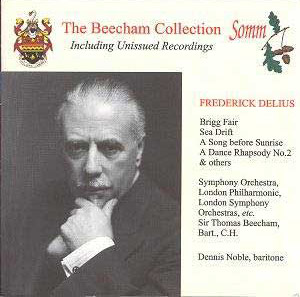Somm are right prominently to note on the cover of
their Beecham Collection that unissued recordings are included. Not
only is this one of the most exciting aspects of their collaboration
with Lady Shirley Beecham but also it alerts one to the fact that these
are not simply run-of-the-mill reissues of the pre-War Beecham-Delius
discography. The disc presents the unissued 1928 Sea Drift and two of
the North Country Sketches from a never before released session of 1945
which also includes the similarly unreleased A Song before Sunrise and
A Dance Rhapsody No 2. The disc also includes Beecham’s earliest recordings
of Delius, made in December 1927, by which time the conductor had been
associated with the music for nearly twenty years. That experience is
palpable and if, in the main, these performances are less obviously
impassioned than his later ones, they lose nothing in conviction or
mastery.
Beecham encourages some noticeably fine contributions
in Brigg Fair, not least from the strings and the flute and there
are some fine individualists amongst the wind players generally whilst
On Hearing the First Cuckoo in Spring is affectionate without
cloying. The string portamentos at 2’55 are prominently expressive but
well scaled in terms of the playing generally. There is an effective
languor to the performance that is beguiling. Beecham’s superb rubato
animates The walk to the Paradise Garden – his supreme rhythmic
licence emerges with absolute naturalness. Both these last two were
in fact cited in a letter from composer to conductor as Delius’ favourites
of his own recordings. Sea Drift is noted as having been previously
unissued but I am sure that it has been out before, albeit with limited
circulation, on LP. There are balance problems here, with the first
part of Dennis Noble’s entry pretty much inaudible; there are also balancing
concerns with the Choir, especially so in the passage beginning Shine,
shine, shine. The uncredited violin soloist, very prominent, and
recorded fractionally too close to the microphone must be W H Reed;
his playing is most attractive, small-scaled and persuasively pliant.
Noble himself is in fine voice, well rounded and firmly projected. When
he sings over the hoarse surging of the sea he covers his vowels
with subtle intelligence and elsewhere colours his voice musically.
It is perhaps a slightly over-inflected performance though gains are
ones of textual familiarity and clarity with Noble reaching a peak of
eloquence in the lines O darkness – most impressive.
The remainder of the recordings date from 16 October
1945. The slightly swishy test pressings have been well filtered without
losing frequencies. The LPO was still on reasonable form after the exigencies
of the war but whilst the North Country Sketches are attractively
and atmospherically done they are somewhat inferior to the subsequent
recording of 1946. A Song before Sunrise is expressive and full
of life whilst A Dance Rhapsody No 2 is briskly clear-eyed and with
pastel shadings with some very impressive woodwind playing. A most useful
adjunct for the commercial disc of the following year.
Graham Melville–Mason once again writes the enjoyable
and instructive sleeve notes. Fifty or so minutes of as good as unissued
Beecham Delius is a highly tempting proposition.
Jonathan Woolf


